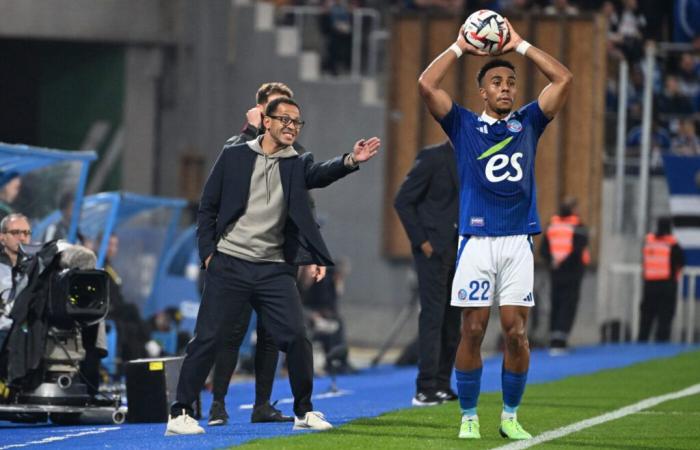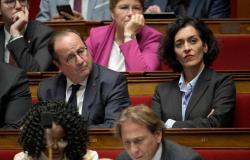
Beyond the results (Strasbourg is 9e with 13 points), we have the impression that something has been happening on the pitch since the start of the season. Do you feel like that too?
Already, I find that we have a group that is doing well. I think the supporters find themselves seeing us play on the pitch. We work in a good atmosphere, in a good mood, we listen, we like to make efforts for each other… I think we see it on the ground. There are also many young people (Racing is the youngest squad in L1 this season with an average age of 22.1 years, Editor's note)it creates a special bond. We understand each other, there is a connection.
In the game, you are a very patient team when it comes to ball releases. Is this something you particularly work on in training?
Yes, we work on it a lot in training, it starts with what we call the goal kicks (the six meters). Afterwards, there are a lot of pass routes that we work on. This is our game: we don't want to be just a team that throws the ball, we want to have an identity.
How does it allow a player to flourish more easily in the team, to have such strong principles?
We already have a lot more reference points: when my center has the ball, I know where to place myself, I know what I have to do. Same when it's my eccentric. It requires us to communicate a lot with each other, we are progressing in many areas. Ultimately, it's a very rich style of play in which we have a lot of fun, because we have a lot of possession. And it also gives us more responsibilities: we find ourselves in situations which may seem more complicated than if we just cleared the ball.
I really like coming up against fast, technical attackers, those who can be found in big matches. I like to tell myself: there you go, this guy, he's not going to pass, and I'm going to block him.
You signed in Strasbourg the day after the appointment of Liam Rosenior. What was your first contact with him?
We experienced the first session together with the group. Arriving at a new club with a new coach puts everyone back on the same basis.
What have you learned in your three months with Rosenior?
I started in the professional world not very long ago, so I haven't known many coaches. I learned a lot about my positioning with the ball. I also play a slightly different position from what I had at Rennes, where I was a more attacking full-back. Here, my role is more defensive with a three-man defense and I'm learning every day.
Loving to defend, is that something you had to force during your training or was it already in you?
I always had that in me! I have always loved defending, since I was little. My training is as a defender, even if I played a few matches in midfield, but I am a defender above all. I like it. Even at the end of the sessions, I enjoy continuing to play one-on-one with my teammates to have fun and progress.
When we come to football as a kid, we first identify with the offensive players, with those who put on a show. How do we come to say that we want to frustrate them by stopping them?
I really like coming up against fast, technical attackers, those who can be found in big matches. It's a challenge and that's where I enjoy it. I like to tell myself: there you go, this guy, he's not going to pass, and I'm going to block him. When I make good defensive interventions without making mistakes, when I recover the ball and I show my team that I am there, it is in these moments that I take pleasure in doing my job. The more duels I win, the more fun I have.
Leaving Rennes is above all a personal choice. I felt that I was reaching the end of the cycle and that I needed a new challenge to progress.
Since the start of your career, have there been duels with opponents that have had a greater impact on you than others?
Obviously, Mbappé. He's so fast, it's different management. We can show vice, for example, it's part of the game. (He played with his nerves in the Coupe de France semi-finals last April, Editor's note.) It was also a big match against Rafael Leão when we played against Milan in the Europa League.
When you face this kind of players, can you say that you are still far away?
No, it doesn't happen like that. Of course I'm at the level. Now, mistakes happen, the goal is not to reproduce them. Against Leão at San Siro, I lost a duel, but now it can be corrected!
You arrived at Stade Rennes very young, you played all levels there. How did you make the decision to leave the club last summer?
It's football. After a while, you also have to make choices for progression. It's not necessarily easy because I've been at the club for more than ten years. But now, it's a new city, a new challenge, with objectives.
Did it have a link with Julien Stéphan? Did you feel the same confidence from him?
I don't really want to go into details. To answer briefly, it's mostly a personal choice. I felt that I was reaching the end of the cycle and that I needed a new challenge to progress. It was also stepping out of my comfort zone.
You were never presented as a crack player, or even as a player destined to one day play in Ligue 1 during your training. Did you feel it and how did you deal with it all?
A life, a career, everyone builds it at their own pace. Some have very strong qualities and reveal themselves very early. They understand the game earlier, they are ready from 16 or 17 years old. It’s football that’s changing too. Others, it's a little later. I have always been a hard worker, I have always believed in myself and it has paid off.
When did you tell yourself you could become a pro?
As soon as I started playing football. Well, when you're little, it's true that you don't necessarily think about it, but once you arrive at the training center, that means things get serious. This is also where discipline is established. I wasn't playing just to play football, but to go pro, to step on the pitch at Roazhon Park and many others.
What did the very young Guela dream of?
I remember when I went to the stadium with the family, I told myself that I wanted to be on the field and that I was going to be there. (Laughs.) It was the Stade Rennes of the time, with Costil in goal and Mexer in defense.
The player you mention is Mexer, a defender, when some would have rather spoken of Ben Arfa.
Ah well yes, I was watching the player at my position! Afterwards, I think that not everyone watches matches in the same way. There are some it's just for fun, I always try to observe how the player acts, his controls, his passes, his playing intentions, so that I can apply them on the pitch at my level.
During the 2021-2022 season, you suffered a cruciate ligament rupture. How do you manage this serious injury at a pivotal moment for a young player?
I remember it was after preparation, when I was starting to train with the pros at the same time as my brother. At first, obviously, it was a lot of frustration and disappointment, but I immediately got back into work mode after the operation to make this injury a thing of the past.
Désiré, I never saw him as a superstar like that might be the case for some. For me, he remains my little brother.
We talked about it a little above, but to focus on the family: how did you experience evolving alongside a little brother (Désiré Doué) who was considered a great talent from a very young age?
He's my little brother, so we played in the garden together every day, and I never saw him as a superstar like some people did. For me, he remains my little brother. Obviously, it was inspiring and motivating to see him always outperform or shine on the pitch. I wanted to do the same! We really pulled each other up, we were together all the time, even to work outside of football. It was good to compete against him, and even for him, it was good to learn against a good defender. (Laughs.) We did a lot of one-on-ones, it was really nice.
We could hear people saying that you were just there because your little brother was there. You must have heard that.
Yes, obviously, I heard it all the time. But hey, I wasn't listening. I was focused on what I could do, I believed in myself and I knew my time would come.
He's your little brother, but did he still help you at the start of your career with his precocity?
He arrived a little before me in the pros, so he talked to me a lot and gave me some advice when it was my turn. It's funny because it comes from my little brother, but it really helped me.
You were together all the time while both being at Stade Rennes, did you have a little apprehension when you were no longer in the same club as him?
Not at all because I know we are very close, and the bond doesn't get lost like that, even if we now play in two different clubs. We call each other all the time, we still see each other a lot. Everyone has their challenge and I am very happy that we can flourish, it is the most important thing to continue to progress.
Since last March, you have been an Ivorian international. What does it feel like and what is your connection with this country?
My father is Ivorian, I have been going to Ivory Coast since I was little, it is my roots, and I am proud to represent these colors. They had created links with the African Cup of Nations, but you have to know how to adapt and it was a dream. There's no problem, I'm just happy.
The ranking of the most highly rated Ligue 1 squads





